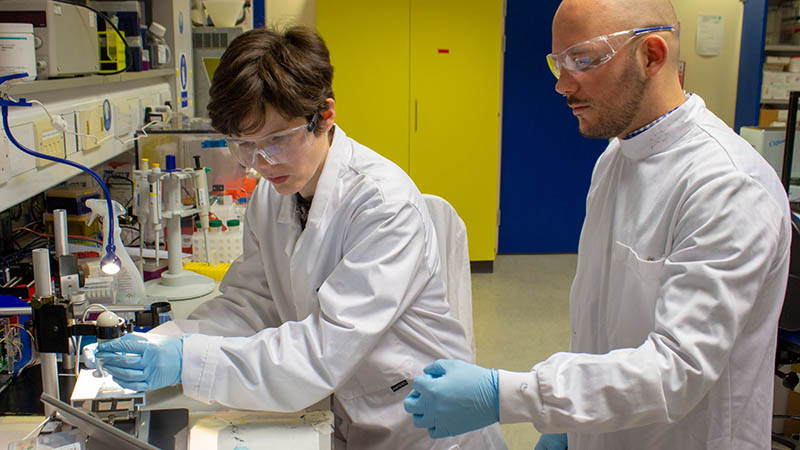Published:

Researchers from Heriot-Watt University are helping scientists and clinicians to conduct organ and tissue research more effectively and sustainably – using a plant-derived material.
Dr Maïwenn Kersaudy-Kerhoas and Alfredo Ongaro from the Institute of Biological Chemistry, Biophysics and Bioengineering have worked with industry partners to create the first Organ-On-Chip technology that uses Polylactic Acid (PLA).
PLA is a non-toxic, environmentally sustainable material derived from glucose fermentation and its application to Organ-On-Chip (OOC) technology will bring more environmental sustainability to the biomedical industry sector.
First conceived in 2007 to artificially mimic the mechanics and physiological response of organs, OOC is used widely in medical and pharmaceutical research to investigate the effects of drugs and other chemicals on organs. OOC allows scientists to improve the accuracy of data collection and create more physiologically relevant testing areas without harming animals. OOC technology could improve personalised medicine by mimicking the patient organ response to a certain drug by using the cells of the patient itself.
However, 57% of OOC technology currently uses polydimethylsiloxane (PDMS), which is a flexible fossil-derived material known to release unwanted molecules and can bind to proteins under certain conditions. This, in certain cases can cause questionable and unpredictable results, and funders have been calling for alternatives to be developed.
Writing in BioRxiv, the Heriot-Watt team have shown that Polylactic Acid (PLA) overcomes many of the issues presented by PDMS in OOC studies, demonstrating it is cheaper and easier to produce and translates well to mass production.
Dr Kersaudy-Kerhoas said: “Our research demonstrates that safer, more efficient materials can be used that will achieve more reliable results when gathering data from lab-grown tissue. Using Polylactic Acid (PLA) in Organ-On Chip applications could change how we view this technology, removing the need for expensive and ethically questionable animal testing, without compromising on sustainability or the accuracy of the results generated.
“More than half of current Organ-On-Chip technologies use polydimethylsiloxane (PDMS), which is derived from petrol and other fossil fuels. PLA, however, is a sustainable plastic, produced using renewable resources with a focus on sustainable production chains. This biocompatible material could be part of the next generation for Organ-On-Chip and Microfluidic technology.
“Working with colleagues from the University of Leeds, University of Rome Tor Vergata and two leading European Microfluidic manufacturers, microfluidic ChipShop and Micronit, we have produced Organ-On-Chip prototypes that build understanding about the importance of sustainability in this arena. We want to help advance the knowledge of material interactions at the micro and nanoscale for all microfluidic and lab-on-chip applications.”
Dr Holger Becker, Chief Scientist Officer at microfluidic ChipShop said: “Currently, very little research and even fewer commercial activities have taken place in the field of biodegradable polymers for microfluidics. Given the need for more environmentally friendly products also in this field, we are happy to collaborate with Dr Kersaudy-Kerhoas's group at Heriot-Watt University in order to find practical and commercially viable solutions in order to fulfil our societal responsibilities.”
The project is funded by the EPSRC (EP/R00398X/1) and the Organ-On-A-Chip Technology network.